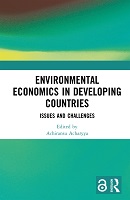Chapter 13 Household waste management and the role of gender in Nepal
Proposal review
| dc.contributor.author | Nepal, Mani | |
| dc.contributor.author | Cauchy, Marina | |
| dc.contributor.author | Karki Nepal, Apsara | |
| dc.contributor.author | Gurung Goodrich, Chanda | |
| dc.date.accessioned | 2022-10-26T09:24:22Z | |
| dc.date.available | 2022-10-26T09:24:22Z | |
| dc.date.issued | 2022 | |
| dc.identifier.uri | https://library.oapen.org/handle/20.500.12657/59104 | |
| dc.description.abstract | Solid waste management has become one of the most important issues in urban centres of developing countries where population growth puts pressure on public services. Nepal is struggling to manage municipal solid waste in urban centres due to a lack of segregation at the source, recycling, and proper disposal. This chapter examines whether women and men manage household waste differently at the household level, especially at source segregation, managing recyclable waste (paper and plastic), and composting degradable waste. Using household survey data from the Bharatpur Metropolitan City of Nepal, we find that women are more likely to segregate waste at the source and also manage degradable waste at home better. Still, there is no gender difference in selling plastic and paper waste. In contrast, women are more likely to give paper or plastic waste either to the waste collectors (free) or throw away, suggesting a heterogeneity across gender when it comes to managing household waste. In most cases, women waste managers perform well (segregating at source and composting degradable waste), but they do not seem to do well in all areas of plastic or paper waste management where some sort of sensitization may be helpful. | en_US |
| dc.language | English | en_US |
| dc.subject.classification | thema EDItEUR::K Economics, Finance, Business and Management::KC Economics::KCV Economics of specific sectors::KCVG Environmental economics | en_US |
| dc.subject.classification | thema EDItEUR::K Economics, Finance, Business and Management::KC Economics::KCM Development economics and emerging economies | en_US |
| dc.subject.classification | thema EDItEUR::R Earth Sciences, Geography, Environment, Planning::RN The environment::RND Environmental policy and protocols | en_US |
| dc.subject.classification | thema EDItEUR::J Society and Social Sciences::JB Society and culture: general | en_US |
| dc.subject.other | Household waste, waste segregation, composting, recycling, gender roles | en_US |
| dc.title | Chapter 13 Household waste management and the role of gender in Nepal | en_US |
| dc.type | chapter | |
| oapen.identifier.doi | 10.4324/9781003253884-18 | en_US |
| oapen.relation.isPublishedBy | 7b3c7b10-5b1e-40b3-860e-c6dd5197f0bb | en_US |
| oapen.relation.isPartOfBook | 52442a30-a445-4de6-9b50-e734dbed01f1 | en_US |
| oapen.relation.isbn | 9781032182919 | en_US |
| oapen.relation.isbn | 9781032384504 | en_US |
| oapen.imprint | Routledge | en_US |
| oapen.pages | 23 | en_US |
| oapen.remark.public | Funder name: European Union’s Horizon 2020 research and innovation program/ Funder grant number: 852190 (ERC Starting Grant 2019) / Funder program: COFUTURES | |
| peerreview.anonymity | Single-anonymised | |
| peerreview.id | bc80075c-96cc-4740-a9f3-a234bc2598f1 | |
| peerreview.open.review | No | |
| peerreview.publish.responsibility | Publisher | |
| peerreview.review.stage | Pre-publication | |
| peerreview.review.type | Proposal | |
| peerreview.reviewer.type | Internal editor | |
| peerreview.reviewer.type | External peer reviewer | |
| peerreview.title | Proposal review | |
| oapen.review.comments | Taylor & Francis open access titles are reviewed as a minimum at proposal stage by at least two external peer reviewers and an internal editor (additional reviews may be sought and additional content reviewed as required). |

